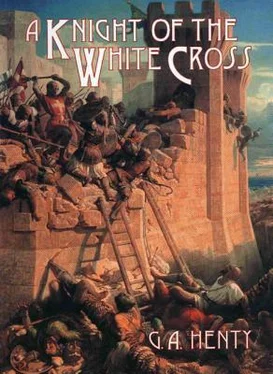"Then the pirates — if this be, as I hope, their work — must have landed at some other point on the island, and if they catch sight of us they may make for their ship and slip away, unobserved by us. Instead of rowing direct, therefore, we will make for that islet to the right, and row round behind it. There are two others almost adjoining it. Once past these, 'tis not more than half a mile to that island stretching away south. Once round that, we shall be beyond the one from which we see the smoke rising, and can come down on its southern side. The course will be double the distance that it would be if we took a straight line, but except when we cross from island to island we shall not be exposed to their view, and may fall upon their ships before the crews have returned from their work of plunder."
The knights fully agreed, and orders were given to the helmsman accordingly.
"We must not over fatigue the rowers," the commander said. "We may have a long chase if they have started before we get round."
He therefore gave orders to the slaves that, while they were to exert themselves to the utmost when crossing the open sea, they were to relax their efforts and to row within their strength while coasting along behind the islands. On board, everything was made in readiness for a fight: the knights buckled on their armour, the cooks set cauldrons of pitch over the fire, the cannoneers loaded her eight guns. It was an hour and a half after their start before they rounded the end of the last island. It extended a little farther to the south than did that to which they were making, and as they rounded the point, eager looks were cast in search of the pirate ships. No craft were, however, to be seen.
"They must be in some bay or inlet," the commander said; "they can hardly have left, for it would have taken them half an hour at least to cross the island with their booty and captives, and even if they made straight away after having fired the village, their ship could have gone no great distance, for we must have seen her if she put to sea — unless indeed they were anchored on the east of the island, and have sailed in that direction."
"Keep them rowing along steadily," he said to the overseers of the slaves; "but do not press them too hard. We may have a chase yet, and need all their strength, for most of these pirates are fast craft, and if they should get a start of three or four miles, it will be a long row before we catch them."
They made straight for the island, and on nearing it coasted along its southern side. It was some three miles long, the shore being for the most part steep, but here and there falling gradually to the water's edge. Two or three little clusters of houses could be seen as they rowed along; one of these was on fire.
"That is good," Sir Louis exclaimed, as, on turning a point, they saw the flames. "That cannot have been lighted long, and we are pretty certain to come upon the vessels before the marauders have set sail."
Several inlets and small bays were passed, but all were empty. A few fishing boats lay on the shore, but there were no signs of life, as no doubt the people would, long since, have taken alarm and sought shelter in the woods. There was a sharp point just before they reached the southeastern extremity of the island, and as the galley shot past this, a shout of exultation rose from the knights, for, near the mouth of an inlet that now opened to their view, there lay four long, low vessels, above each of which floated the Moslem flag. A number of men were gathered on the shore near the ships, and heavily laden boats were passing to and fro.
A yell of rage and alarm rose from the ships as the galley came into view. There was a stir and movement on the shore, and numbers of men leapt into the boats there, and started for the ships. These were some quarter of a mile away when first seen, and half that distance had been traversed when a puff of smoke shot out from the side of one of them, followed almost immediately by a general discharge of their cannon. One ball tore along the waist of the galley, killing six of the rowers, and several oars on both sides were broken. Two balls passed through the cabins in the poop. But there was no pause in the advance of the galley. The whips of the slave masters cracked, and the rowers whose oars were intact strained at them. There was no reply from the guns, but the knights raised loud the war cry of the Order, a war cry that was never heard without striking a thrill of apprehension among their Moslem foes.
As they neared the pirate ships, the helm was put down, and the galley brought up alongside the largest of them and a broadside poured into her; then the knights, headed by their commander, leapt on to her deck.
Although a number of the crew had not yet come off from shore, the Moslems still outnumbered their assailants, and, knowing that their consorts would soon come to their aid, they threw themselves in a body on the Christians. But in a hand-to-hand conflict like this, the knights of the Hospital were irresistible. Protected by their armour and long shields from the blows of their enemies' scimitars and daggers, their long, cross handled swords fell with irresistible force on turbaned head and coat-of-mail, and, maintaining regular order and advancing like a wall of steel along the deck, they drove the Moslems before them, and the combat would soon have terminated had not a shout been raised by one of the overseers of the slaves. One of the other ships had rowed alongside the galley, and the crew were already leaping on board it. At the same moment another ship came up alongside that they had boarded, while the fourth was maneuvering to bring up under her stern.
"Sir John Boswell," Sir Louis shouted, "do you and your countrymen, with the knights of Spain, finish with these miscreants; knights of Germany and Provence keep back the boarders; knights of Auvergne follow me," and he leapt down into the galley.
The English and Spanish knights redoubled their exertions. The Moslems endeavoured to rally, seeing that help was at hand, and that but a small body were now opposed to them, but their numbers availed little. The ten knights kept their line, and, hewing their way forward, pressed them so hotly that the Turks broke and sprang over the bulwarks into the sea. Then the knights looked round. A fierce fight was going on between those of Germany and Provence and the enemy, who strove desperately to board from the ship alongside. The other vessel was now almost touching the stern, and her crew were swarming to her side in readiness to leap on board as soon as the vessels touched.
"We will keep them at bay there," Sir John Boswell shouted. "Do you, Don Pedro, and your comrades, aid Ricord. When his foes are finished with, you can come back to help us."
Then, with the four English knights, he ran along the deck, and reached the stern just in time to hurl backwards the Moslems, who had already obtained a footing. For a time the five knights kept back the surging mass of their foes. The deck was wide enough for each to have fair play for his sword, and in vain the pirates strove to obtain a footing.
At last Sir Marmaduke Lumley fell, severely wounded by an arrow from a Moslem marksman, and before the others could close the gap a score of pirates leapt on to the deck.
"Fall back, comrades, fall back; but keep together!" Sir John Boswell shouted, as he cleft the skull of one of the pirate officers who sprang at him. "Sir Louis will soon finish his work, and be here to our aid. Ah!" he exclaimed, looking over his shoulder, as he retired a step, "Provence and Germany are overmatched too."
This was indeed the case. Stoutly as they fought the knights were unable to guard the whole of the line of bulwark, and the Moslems had already obtained a footing on the deck. The discipline of the knights stood them in good stead. Drawing closely together as they retreated, they made a stand on the opposite side of the deck, and were here joined by Sir John Boswell and his companions. They now formed a semicircle, each flank resting on the bulwark, and the pirates in vain endeavoured to break their line. Again and again they flung themselves upon the knights, only to be beaten off with heavy loss. At length a loud cheer arose from the galley, and Sir Louis Ricord, with the knights of Auvergne and Spain having cleared the galley of their foes, and carried the pirate that had grappled with her, sprang on to the deck of the ship, and fell upon the throng that were attacking the knights there, oblivious of what was going on elsewhere. At once the English knights and their comrades took the offensive, and fell upon their assailants who, at the sight of the reinforcement, for a moment stood irresolute. For a short time there was a fierce struggle; then the pirates sprang back to their two ships, and endeavoured to cast off the grapnels. But the knights followed hotly upon them, and, panic stricken now, the pirates sprang overboard. Many were drowned, but the greater part managed to swim to shore.
Читать дальше












